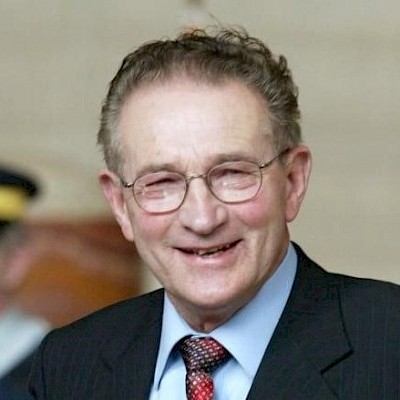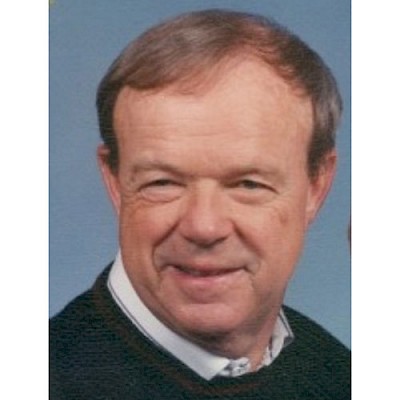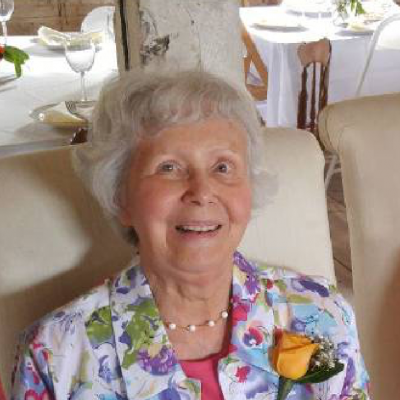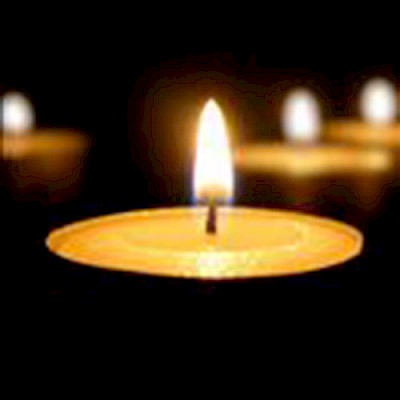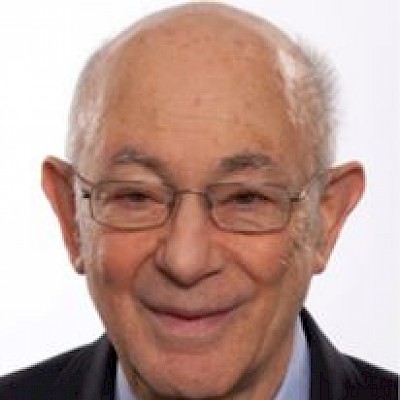With profound sadness, we announce the passing of Dr. Robert George Grossman. As the most loving husband, father, father-in-law and grandfather in the universe, he was our North Star, our compass forward. We are grieving deeply as a family. We are also filled with gratitude for the life he led and the legacy he leaves.
Born on January 24, 1933, in The Bronx, New York, Dr. Grossman is preceded in death by his parents, Dr. Ferenc Grossman and Vivian Eisenberg Grossman. Dr. Grossman was an only child and was adored by his parents who were both immigrants to the United States. Ferenc, who was born in Hungary, was a family practice doctor, and Vivian, who was born in Lithuania, was a grade schoolteacher. Together, they believed that hard work and caring for others were traits to live by and they were successful in their new country. Ferenc and Vivian's greatest love was for their son, and they nurtured Dr. Grossman's interests in science, math, poetry, literature, philosophy and classical music. Ferenc never refused a patient and would treat patients even if they could not afford to pay. In return, grateful families would leave baskets of eggs or bottles of milk on their doorstep. That legacy of caring for others made an indelible mark on Dr. Grossman, who made that a cornerstone of his life's work. Dr. Grossman would treat his patients with compassion and dignity, no matter who they were. He would also make house calls, taking his old school black doctor's bag to the homes of patients who needed help. He was a listener and had a calm and kind manner and would take the time to really hear what his patients were saying and then proceed to help them.
Dr. Grossman honored both his mother and father by becoming a practicing neurosurgeon and a professor. Dr. Grossman had a memorable and loving childhood in New York City and graduated from the Horace Mann School in 1949. He would recall many happy times growing up -- from once getting locked in the Bronx Zoo with a group of friends after dark to his Bar Mitzvah at age 13 and meeting his future wife, Ellin, when he was 16 years old, and she was just 15. It was absolute love at first sight and they were together from that moment on. They were married in 1955 at Ellin's parent's apartment on the Upper East Side and celebrated their 66th wedding anniversary this past June.
Dr. Grossman attended Swarthmore College and graduated in 1953 with a Bachelor of Arts degree with Honors in the Division of Mathematics and Natural Sciences. Always intellectually curious, Dr. Grossman was just 16 years old when he started Swarthmore. Swarthmore held some of Dr. Grossman's fondest memories and he spent the rest of his life remarking on the positive impact the college had on him from best friends to a top-notch education.
Upon graduation, Dr. Grossman attended medical school in New York City and received his M.D., College of Physicians and Surgeons of Columbia University, in 1957. Next, Dr. Grossman completed his postgraduate training as an Intern in the surgical service at The University of Rochester, Strong Memorial in 1958.
Dr. Grossman then proudly served the United States of America as a Captain, Medical Corps, U.S.A.R., Department of Neurophysiology. For two years, from 1958 to 1960 Dr. Grossman worked at the Walter Reed Army Institute of Research, Washington, D.C. in the Laboratory of Robert Galambos, M.D.
From 1960 to 1962, Dr. Grossman was a Resident and in 1963, he was Chief Resident, Department of Neurological Surgery, Neurological Institute of New York, at the Columbia-Presbyterian Medical Center.
Upon finishing his residency in 1963, Dr. Grossman moved to Texas and accepted his first neurosurgical position as Associate Professor, Division of Neurological Surgery, at The University of Texas Southwestern Medical School in Dallas. Dr. Grossman stayed there until 1968, becoming an instructor and then Assistant Professor. It was while he was at work at Parkland Hospital on November 22, 1963 that Dr. Grossman received a phone call to rush to Trauma Room One. President John F. Kennedy had been shot and Dr. Grossman, as one of the two neurosurgeons on staff, was summoned to attend the president.
In 1969, Dr. Grossman and his family moved back to New York where he was appointed Associate Professor and then Professor of Neurological Surgery, Department of Neurological Surgery, Albert Einstein College of Medicine, Bronx, New York. And, in 1973, Dr. Grossman returned to Texas -- this time to Galveston -- to be the Professor of Surgery and Chief of the Division of Neurological Surgery. It was his first Chairmanship and Dr. Grossman was proud of the work accomplished in Galveston.
In 1980, Dr. Grossman was appointed Chairman, Department of Neurosurgery, The Methodist Hospital, in Houston, Texas. Additionally, Dr. Grossman was appointed the Chairman of Neurosurgery at Baylor College of Medicine from 1980 to 2005. Dr. Grossman remained the Chairman of Neurosurgery at The Methodist Hospital from 1980 to 2013 and has continued to be a Professor of Neurosurgery since 2013. Dr. Grossman was also the Founder and First Director, Neurological Institute, The Methodist Hospital in 2005.
In 2004, Dr. Grossman founded North American Clinical Trials Network (NACTN) for Spinal Cord Injury (SCI). NACTN's mission is to continually advance the quality of care and the quality of life of people with spinal cord injury through clinical trials of new therapy that provide strong evidence of safety and effectiveness.
Not many people make it to age 88 and still work, but Dr. Grossman's passion for advancing medicine never stopped. He was very proud that he was able to work his entire life and never retired. He believed with 24 hours in a day, much could be accomplished. And so he did.
Dr. Grossman had a keen interest in helping patients with epilepsy, traumatic brain injury, Parkinson's Disease, spinal cord injury and brain tumors. He made an impact in both helping patients as well as making scientific contributions in all of those neurological areas. From 1960 until 2012, Dr. Grossman performed more than 8,000 major neurosurgical operations.
It was common for Dr. Grossman to be at dinner or a grandchild's school event and have people walk over to say how much they appreciated his care for them or a family member. Those comments always brought him joy that he was able to help make a difference.
Dr. Grossman created his own filing system that became his signature: a stack of white index cards, wrapped in a green rubber band that he kept in the pocket of his white doctor's coat or the front of his button-down shirt. Dr. Grossman would keep detailed notes about his patients and would constantly add to the notes to ensure their care. And he also would keep notes on books he wanted to read, PBS shows to watch and notes about which friend was having a birthday, an anniversary, or a baby.
His dedication for training other doctors to become neurosurgeons was his calling. He was extremely proud of the fact that the neurosurgeons he trained and worked with are now among the leaders in the field in Houston and around the country. Dr. Grossman trained two percent of the neurosurgeons in the United States.
Additionally, Dr. Grossman had a keen interest in scientific research. He was a prolific writer, and wrote eight medical books, including Medical Neurobiology: Neuroanatomical and Neurophysiological Principles Basic to Clinical Neuroscience. Dr. Grossman also wrote 216 articles for scientific journals and chapters in 52 different medical textbooks.
Dr. Grossman served on the Editorial Boards of the Journal of Neurosurgery, Neurosurgery and World Neurosurgery. Additionally, he served as Chair, American Board of Neurological Surgeons and President of the Society of Neurological Surgeons. He was a member of the Christopher Reeve Foundation International Research Consortium Advisory Panel and helped guide their research program. In Houston, Dr. Grossman helped found the Houston chapter of the Epilepsy Association Texas and was involved with TIRR and the Houston Area Parkinson's Society.
Dr. Grossman was awarded many honors and some of his most cherished were accepting the Cushing Medal from the American Association of Neurological Surgeons, 2007, for service to Neurosurgery; and the Albert and Ellen Grass Foundation Prize and Medal from the Society of Neurological Surgeons, 1988, for continuous commitment to research in the neurosciences.
Outside of work, Dr. Grossman had numerous interests: photography, sundials, astronomy, sailing and fly fishing. He was a prolific reader and read everything from Greek and Roman classics to English poetry and mystery novels. Dr. Grossman was perennially cheerful, upbeat and a joy to be around. People would always remark that Dr. Grossman was a true gentleman -- and his calm, reassuring demeanor are going to be missed.
And even though he was so proud of his professional accomplishments, Dr. Grossman was even more proud of his family. And it all started with Ellin. Theirs was a love story that knew no bounds. They were inseparable and devoted to one another.
Together, they traveled the world from France to Israel, Japan to Scotland, Egypt to Italy and beyond. They built a vacation home in Santa Fe, New Mexico that became their happy place, their true sanctuary. In Santa Fe, they would hike, birdwatch, eat, look at the stars, visit the library and the museums and enjoy friendships and camaraderie. At home in Houston, they and would attend productions of the Gilbert and Sullivan society, Alley Theater and the Houston Grand Opera among others. They would read books, exercise, and spend time with dear friends and family. They also had two wonderful Westie dogs that they loved and they also treasured their involvement with the West Highland White Terrier Club of Southeast Texas.
Dr. Grossman was always so proud of his family, who will forever love him. He is survived by the love of his life, Ellin and their children and grandchildren: Dr. Amy Coburn and husband Dr. Michael Coburn, along with their son Jeff Coburn and daughter Laura Coburn; daughter Kate Rose along with her son Joel Gottsegen and her daughter Claire Gottsegen; and daughter Jennifer Oakley and husband Bruce Oakley along with their children Jessica Sosa and her husband Jonathan Sosa, Sarah Oakley, Connor Albert, Paige Albert and William Robert Oakley, who was named after Dr. Grossman.
His nine grandchildren named him "Grumpy" -- which they all thought was funny because it was the furthest thing from the truth. He loved his grandchildren with all his heart and was always a source of information, someone to talk to and learn from and the creator of memorable times. The annual Grandchildren's New Year's Eve sleepovers are cherished memories. If a grandchild said they were interested in geology, a geode would be given to them. If they said they liked music, he would give them CDs of Mozart; if they were interested in geography, he would give them a globe. If they were interested in animals, he took them to the Galapagos Island. In truth, he was giving them the world. And they all knew it.
Dr. Grossman cared about people. He had the ability to make everyone feel special -- but that is because he really did think they were. For his family, he wasn't just working at his job, he was demonstrating how waking up early and going strong all day long allows you to get more out of each day; when he was given an award from TIRR just a few years ago, he accepted it with gratitude and then said "I still have much work to do." In his medical research, he was not just working to help try and find a cure for spinal cord paralysis but he was teaching his grandkids to think about others, to help those in need, to try and go further and search for solutions where none yet exist. When he used to go the grandchildren's schools to give a lecture about how the brain works, he was not talking about himself and his accomplishments, he was demonstrating how to be curious and to give back to others through selfless service. He believed helping and teaching others is a key to life. And, when he woke up every morning singing and telling Ellin that he loved her, he was teaching our family how to find joy and care for a spouse.
We don't know who revolves around whom in our family but we tend to think we all revolved around Dr. Grossman. It's no wonder that Dr. Grossman was fascinated by the cosmos, because in our family, simply put, he hung the moon.
As a family, we would like to thank Dr. Grossman's close friends and colleagues who helped care for him. It is a sad irony that a man whose life was devoted to the study of neurological diseases was confronted with Parkinson's Disease. Like everything else in his life, Dr. Grossman faced it bravely, squarely and gracefully. Dr. Grossman's medical team of Dr. Robert Jackson, Dr. Al Raizner and Dr. Eugene Lai were unparalleled in their expert care.
